Guardian angel
A guardian angel is a type of angel that is assigned to protect and guide a particular person, group or nation. Belief in tutelary beings can be traced throughout all antiquity. The idea of angels that guard over people played a major role in Ancient Judaism. In Christianity, the hierarchy of angels was extensively developed in the 5th century by Pseudo-Dionysius the Areopagite. The theology of angels and tutelary spirits has undergone many changes since the 5th century. Belief in both the East and the West is that guardian angels serve to protect whichever person God assigns them to, and present prayer to God on that person's behalf.
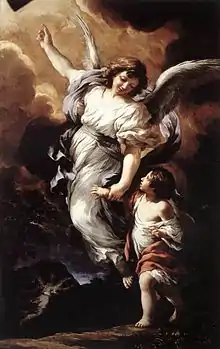
In the books of the Hebrew Bible and Old Testament
The guardian angel concept is present in the books of the Hebrew Bible and the Old Testament, and its development is well marked. These books described God's angels as his ministers who carried out his behests, and who were at times given special commissions, regarding men and mundane affairs.[1]
In Genesis 18-19, angels not only acted as the executors of God's wrath against the cities of the plain, but they delivered Lot from danger; in Exodus 32:34, God said to Moses: "my angel shall go before thee." At a much later period, we have the story of Tobias, which might serve for a commentary on the words of Psalm 91:11: "For He will command His angels concerning you to guard you in all your ways" (Cf. Psalm 33:8 and 34:5 — 34:7 and 35:6 in Protestant Bibles).
The belief that angels can be guides and intercessors for men can be found in Job 33:23-26, and in Daniel 10:13 angels seem to be assigned to certain countries. In this latter case, the "prince of the kingdom of Persia" contends with Gabriel. The same verse mentions "Michael, one of the chief princes".
In Judaic rabbinic literature through modern Judaism
Rabbinic literature
In Rabbinic literature, the Rabbis expressed the notion that there are indeed guardian angels appointed by God to watch over people.
Rashi on Daniel 10:7 "Our Sages of blessed memory said that although a person does not see something of which he is terrified, his guardian angel, who is in heaven, does see it; therefore, he becomes terrified."[2]
Lailah is an angel of the night in charge of conception and pregnancy. Lailah serves as a guardian angel throughout a person's life and at death, leads the soul into the afterlife.[3]
Late and modern Judaism
According to Rabbi Leo Trepp, in late Judaism, the belief developed that, "the people have a heavenly representative, a guardian angel. Every human being has a guardian angel. Previously the term `Malakh', angel, simply meant messenger of God."[4]
Chabad believes that people might indeed have guardian angels. For Chabad, God watches over people and makes decisions directly with their prayers and it is in this context that the guardian angels are sent back and forth as emissaries to aid in this task. Thus, they are not prayed to directly, but the angels are part of the workings of how the prayer and response comes about.[5]
In the view of Rabbi Adin Steinsaltz:
The nature of the angel is to be, to a degree, as its name in Hebrew signifies, a messenger, to constitute a permanent contact between our world of action and the higher worlds. An angel's missions go in two directions: it may serve as an emissary of God downward… and it may also serve as the one carries things upwards from below... The angel cannot reveal its true form to man, whose being, senses and instruments of perception belong only to the world of action — it continues to belong to a different dimension even when apprehended in one form or another... The angel who is sent to us from another world does not always have a significance or impact beyond the normal laws of physical nature. Indeed it often happens that the angel precisely reveals itself in nature, in the ordinary common-sense world of causality.[6]
New Testament
In the New Testament the concept of guardian angel may be noted. Angels are everywhere the intermediaries between God and man; and Christ set a seal upon the Old Testament teaching: "See that you despise not one of these little ones: for I say to you, that their angels in heaven always see the face of my Father who is in heaven." (Matthew 18:10).
Other examples in the New Testament are the angel who succoured Christ in the garden, and the angel who delivered St. Peter from prison. In Acts 12:12-15, after Peter had been escorted out of prison by an angel, he went to the home of "Mary the mother of John, also called Mark". The servant girl, Rhoda, recognized his voice and ran back to tell the group that Peter was there. However, the group replied: "It must be his angel"' (12:15). With this scriptural sanction, Peter's angel was the most commonly depicted guardian angel in art, and was normally shown in images of the subject, most famously Raphael's fresco of the Deliverance of Saint Peter in the Vatican.
Hebrews 1:14 says: "Are they not all ministering spirits, sent to minister for them, who shall receive the inheritance of salvation?" In this view, the function of the guardian angel is to lead people to the Kingdom of Heaven.
In the New Testament Epistle of Jude, Michael is described as an archangel.
Christianity
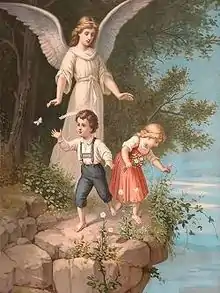
Catholic Church
According to Saint Jerome, the concept of guardian angels is in the "mind of the Church". He stated: "how great the dignity of the soul, since each one has from his birth an angel commissioned to guard it".[1]
The first Christian theologian to outline a specific scheme for guardian angels was Honorius of Autun in the 12th century. He said that every soul was assigned a guardian angel the moment it was put into a body. Scholastic theologians augmented and ordered the taxonomy of angelic guardians. Thomas Aquinas agreed with Honorius and believed that it was the lowest order of angels who served as guardians, and his view was most successful in popular thought, but Duns Scotus said that any angel is bound by duty and obedience to the Divine Authority to accept the mission to which that angel is assigned. In the 15th century, the Feast of the Guardian Angels was added to the official calendar of Catholic holidays.
In his March 31, 1997 Regina Caeli address, Pope John Paul II referred to the concept of guardian angel and concluded the address with the statement: "Let us invoke the Queen of angels and saints, that she may grant us, supported by our guardian angels, to be authentic witnesses to the Lord's paschal mystery".[7]
In his 2014 homily for the Feast of Holy Guardian Angels, October 2, Pope Francis told those gathered for daily Mass to be like children who pay attention to their “traveling companion.” “No one journeys alone and no one should think that they are alone,” the Pope said.[8] During the Morning Meditation in the chapel of Santa Marta, the Pope noted that oftentimes, we have the feeling that "I should do this, this is not right, be careful." This, he said, "is the voice of" our guardian angel.[9] "According to Church tradition we all have an angel with us, who guards us..." The Pope instructed each, "Do not rebel, follow his advice!" The Pope urged that this "doctrine on the angels" not be considered "a little imaginative". It is rather one of "truth". It is "what Jesus, what God said: 'I send an angel before you, to guard you, to accompany you on the way, so you will not make a mistake'".[9]
Pope Francis concluded with a series of questions so that each one can examine his/her own conscience: "How is my relationship with my guardian angel? Do I listen to him? Do I bid him good day in the morning? Do I tell him: 'guard me while I sleep?' Do I speak with him? Do I ask his advice? ...Each one of us can do so in order to evaluate “the relationship with this angel that the Lord has sent to guard me and to accompany me on the path, and who always beholds the face of the Father who is in heaven."[10]
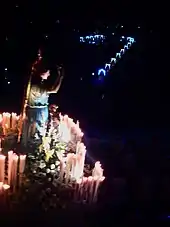
There was an old Irish custom that suggested including in bedtime prayers a request for the Blessed Mother to tell one the name of their guardian angel, and supposedly within a few days one would "know" the name by which they could address their angel. An old Dominican tradition encouraged each novice to give a name to their Guardian Angel so that they could speak to him by name and thus feel closer and more friendly with him.[11] The Congregation for Divine Worship and Discipline of the Sacraments discourages assigning names to angels beyond those revealed in scripture: Michael, Gabriel, and Raphael.[12]
In Cardinal Newman's 1865 poem The Dream of Gerontius, the departed soul is met by his guardian angel who recites:[13]
My work is done
My task is o'er,
And so I come
Taking it home
For the crown is won
Alleluia
For evermore.
My Father gave
In charge to me
This child of earth
E'en from its birth
To serve and save.
Alleluia,
And saved is he.
This child of clay
To me was given,
To rear and train
By sorrow and pain
In the narrow way,
Alleluia,
From earth to heaven.
Angels as guardians
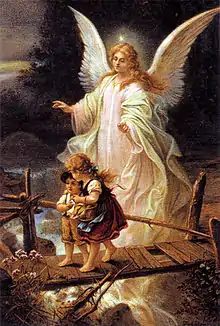
According to Aquinas, "On this road man is threatened by many dangers both from within and without, and therefore as guardians are appointed for men who have to pass by an unsafe road, so an angel is assigned to each man as long as he is a wayfarer." By means of an angel, God is said to introduce images and suggestions leading a person to do what is right.[14]
Saints and their angels
Father Giovangiuseppe Califano recounted how, one day, a newly appointed bishop confessed to Pope John XXIII “that he could not sleep at night due to an anxiety which was caused by the responsibility of his office.” “The pope told him, ‘You know, I also thought the same when I was elected pope. But one day, I dreamed about my guardian angel, and it told me not to take everything so seriously.’”[15] Pope John attributed the idea of calling Second Vatican Council to an inspiration from his guardian angel.[16]
Saint Gemma Galgani, a Roman Catholic mystic, stated that she had interacted with and spoken with her guardian angel.[17] Saint Pio of Pietrelcina was known to instruct his parishioners to send him their guardian angel to communicate a trouble or issue to him when they could not travel to get to him or another urgency existed.[18]
Anglican Communion
Justin Fontenot of the Prayerful Anglican states that the "guardian angel concept is clearly present in the Old Testament, and its development is well marked" and he continues, stating that in "the New Testament the concept of guardian angel may be noted with greater precision".[19] Fontenot also cites Jerome, a Church Father, who said: "'how great the dignity of the soul, since each one has from his birth an angel commissioned to guard it.' (Comm. in Matt., xviii, lib. II)."[19] In the same vein, Of the Intercession and Invocation of Angels and Saints, printed in the Library of Anglo-Catholic Theology, held that "Many learned Protestants think it probable that each of the faithful, at least, has a guardian angel. It seems certainly proved by Scripture. Zanchius says that all the Fathers held this opinion."[20] Building upon Sacred Scripture and the teachings of the Church Fathers, Richard Montagu, the Anglican Bishop of Norwich in the 17th century, stated that "It is an opinion received, and hath been long, that if not every man, each son of Adam, yet sure each Christian man regenerate by water and the Holy Ghost, at least from the day of his regeneration and new birth unto God, if not from the time of his coming into the world, hath by God's appointment and assignation an Angel Guardian to attend upon him at all assayes, in all his ways, at his going forth, at his coming home".[21]
Eastern Orthodox Church
Sergei Bulgakov writes that the Eastern Orthodox Church teaches that:
each man has a guardian angel who stands before the face of the Lord. This guardian angel is not only a friend and a protector, who preserves from evil and who sends good thought; the image of God is reflected in the creature--angels and men--in such a way that angels are celestial prototypes of men. Guardian angels are especially our spiritual kin. Scripture testified that the guardian ship and direction of the elements, of places, of peoples, of societies, are confided to the guardian angels of the cosmos, whose very substance adds something of harmony to the elements they watch over.[22]
As such, before the Eastern Orthodox liturgy of the Communion of the Faithful, a prayer asks "For an angel of peace, a faithful guide, a guardian of our souls and bodies, let us entreat the Lord. Amen."[23]
Lutheran Church
The Reverend Donald Schneider, a Lutheran priest, wrote that the concept of a guardian angel is found in Psalm 91, which includes a verse stating “For [God] will command his angels concerning you to guard you in all your ways. On their hands they will bear you up, lest you strike your foot against a stone”.[24] He states that Martin Luther may have based Morning Prayer and Evening Prayer found in the Small Catechism on this text, as these prayers include the supplication "Let your holy angel be with me, that the evil foe may have no power over me."[24][25]
Methodist Church
The Rev. Dr. John W. Hanner, a Methodist minister and theologian wrote on the topic of guardian angels in his Angelic Study, stating that:[26]
Perhaps every Christian has a guardian angel. It may be that there is one angel to every Christian, or a score of them; or one may have charge of a score of Christians. Some of the ancient fathers believed that every city had a guardian angel, while others assigned one to every house and every man. None of us know how much we are indebted to angels for our deliverance from imminent peril, disease, and malicious plots of men and devils. Where the pious die, angels are to carry the soul to heaven, though it be a soul of a Lazarus."[26]
In May and June 1743, Methodists experienced persecution in Wednesbury and Walsall and the founder of the Methodist Church, John Wesley, was threatened with death by a mob who dragged him in the rain; however, "Wesley escaped unharmed" and he "believed that he had been protected by his guardian angel".[27]
Reformed and Presbyterian Churches
In Reformed Dogmatics, Heinrich Heppe states that some Reformed theologians espoused the view of guardian angels, including Bucan, who taught:[28]
That as a rule to each elect person a certain particular good angel is appointed by God to guard him, may be gathered from Christ's words, Mt. 18. 10, where it is said 'Their angels do continually behold the face of my Father.' Also from Ac. 12.15 where the believers who had assembled in Mark's house said of Peter knocking at the door, 'It is his angel'. These believers were speaking according to the opinion received among the people of God."[28]
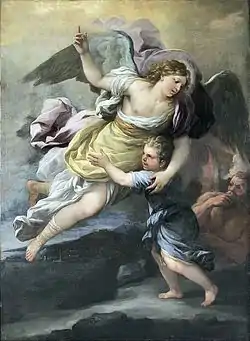
Islam
There is a similar Islamic belief in the Mu'aqqibat. According to many Muslims, each person has two guardian angels, in front of and behind him, while the two recorders are located to the right and left.[29][30]
Zoroastrianism
Also known as Arda Fravaš ('Holy Guardian Angels'). Each person is accompanied by a guardian angel,[31] which acts as a guide throughout life. They originally patrolled the boundaries of the ramparts of heaven,[32] but volunteer to descend to earth to stand by individuals to the end of their days.
Literary usage
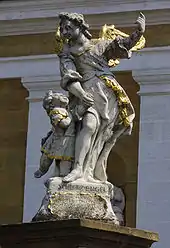
Guardian angels were often considered to be matched by a personal demon who countered the angel's efforts, especially in popular medieval drama such as morality plays like the 15th-century The Castle of Perseverance. In Christopher Marlowe's play The Tragical History of Doctor Faustus, of about 1592, Faustus has a "Good Angel" and "Bad Angel" who offer competing advice (Act 2, scene 1, etc.).[33]
Guardian angels appear in literary works of the medieval and Renaissance periods. Later the Anglican English physician and philosopher Sir Thomas Browne (1605–1682), stated his belief in Religio Medici (part 1, paragraph 33):
Therefore for Spirits I am so farre from denying their existence, that I could easily beleeve, that not onely whole Countries, but particular persons have their Tutelary, and Guardian Angels: It is not a new opinion of the Church of Rome, but an old one of Pythagoras and Plato; there is no heresie in it, and if not manifestly defin'd in Scripture, yet is it an opinion of a good and wholesome use in the course and actions of a mans life, and would serve as an Hypothesis to salve many doubts, whereof common Philosophy affordeth no solution:[34]
By the 19th century, the guardian angel was no longer viewed in Anglophone lands as an intercessory figure, but rather as a force protecting the believer from performing sin. A parody appears in Lord Byron's 1819 poem Don Juan: "Her guardian angel had given up his garrison" (Canto I, xvii).
Author A.L. Mengel's 2016 novel War Angel explores the mystery surrounding guardian angels.
In popular culture
- Clarence Odbody, the guardian angel in the 1946 film It's a Wonderful Life and the 1990 film Clarence, "earned his wings" through bringing awareness that life was worth living to the film's protagonist, George Bailey.
- Teen Angel, Frenchy’s guardian angel in the 1978 film Grease, who advises her to return to high school in the song “Beauty School Dropout".
See also
References
- "CATHOLIC ENCYCLOPEDIA: Guardian Angels". www.newadvent.org. Archived from the original on 2016-03-03.
- "The Book of Daniel, Chapter 10". Tanach with Rashi. Chabad.org and Judaica Press. Archived from the original on 25 October 2012. Retrieved 16 May 2012.
- Schwartz, Howard (1 October 1994). Gabriel's Palace: Jewish Mystical Tales. OUP USA. ISBN 9780195093889 – via Google Books.
- Leo Trepp: A History of the Jewish Experience. p. 55, Zarathushtra.com Archived 2009-12-28 at the Wayback Machine
- "Do we believe in guardian angels?". Chabad.org Ask the Rabbi. Archived from the original on 16 August 2012. Retrieved 16 May 2012.
- The Thirteen Petalled Rose: A Discourse On The Essence Of Jewish Existence And Belief, Basic Books (1985), Page 9, 13, 15
- "Regina Caeli, 31 March 1997 - John Paul II". www.vatican.va. Archived from the original on 13 December 2009.
- France-Presse, Agence. "I believe in angels, says Pope Francis – and they help you make right decisions", The Guardian, October 2, 2014 Archived September 27, 2016, at the Wayback Machine
- Schneible, Ann. "Be like children – believe in your guardian angel, Pope says", Catholic News Agency, October 2, 2014 Archived December 26, 2014, at the Wayback Machine
- Pope Francis, "We all have an angel", L'Osservatore Romano, Weekly ed. in English, n. 41, 10 October 2014 Archived 2 November 2014 at the Wayback Machine
- "Feast of the Guardian Angels (2 October 2014)". wordpress.com. 2 October 2014. Archived from the original on 19 April 2015.
- Congregation for Divine Worship and Discipline of the Sacraments, "Directory on Popular Piety and the Liturgy", §217 Archived 2012-06-23 at the Wayback Machine
- "Newman Reader - Dream of Gerontius - 1". www.newmanreader.org. Archived from the original on 2004-12-17.
- Lovasik SVD, Lawrence. Friendship With the Angels, Tarentum, Pennsylvania
- Jimenez, Marta and Harris, Elise. "Postulators Reflect on Humanity of John Paul II, John XXIII", National Catholic Register, April 23, 2014 Archived October 18, 2015, at the Wayback Machine
- "Boeddeker, O.F.M., Alfred. "Our Guardian Angels", The Catholic Resource Network". ewtn.com. Archived from the original on 2015-02-08.
- Rudolph M. Bell, 2003 The Voices of Gemma Galgani: the Life and Afterlife of a Modern Saint University of Chicago Press ISBN 978-0-226-04196-4 pages 47 and 185
- "Padre Pio The Mystic - Guardian Angels". www.ewtn.com. Archived from the original on 2015-02-15.
- Fontenot, Justin (3 October 2013). "What Are Guardian Angels?". Prayerful Anglican. Missing or empty
|url=(help) - "Of the Intercession and Invocation of Angels and Saints". The Library of Anglo-Catholic Theology. John Henry Parker. 16 (2): 46. 1856.
- Palmer, William (1846). A Harmony of Anglican Doctrine with the Doctrine of the Catholic and Apostolic Church of the East: Being the Longer Russian Catechism : with an Appendix Consisting of Notes and Extracts from Scottish and Anglican Authorities and by all means, whoever searches this reference shall be blessed in the name of the Lord. A. Brown. p. 145.
- Bulgakov, Sergiĭ (1988). The Orthodox Church. St Vladimir's Seminary Press. p. 127. ISBN 9780881410518.
- Guiley, Rosemary (2004). The Encyclopedia of Angels. Infobase Publishing. p. 155. ISBN 9781438130026.
- Schneider, Donald (1 October 2013). "Of Guardian Angels". Faith Lutheran Church. Lutheran Church–Missouri Synod. Missing or empty
|url=(help) - Pfatteicher, Philip H. (1990). Commentary on the Lutheran Book of Worship: Lutheran Liturgy in Its Ecumenical Context. Augsburg Fortress. ISBN 9780800603922.
Luther's prayers are cast in the singular and the German has "let your holy angel." This could be a reference to one's guardian angel, and thus when the prayer is put in the plural the noun angel should logically be made plural also.
- Hanner, John W. (1858). William T. Smithson (ed.). Angelic Study. The Methodist Pulpit, South. Methodist Episcopal Church, South. p. 77.
- Wigger, John (2 September 2009). American Saint: Francis Asbury and the Methodists. Oxford University Press. p. 25. ISBN 9780199741250.
- Heppe, Heinrich (1 January 2008). Reformed Dogmatics. Wipf and Stock Publishers. pp. 212–213. ISBN 9781556357756.
- Quran 13:11 English&Arabic, archived from the original on 2015-04-17
- "Quran Surah Ar-Ra'd ( Verse 11 ) with English Translation لَهُ مُعَقِّبَاتٌ مِنْ بَيْنِ يَدَيْهِ وَمِنْ خَلْفِهِ يَحْفَظُونَهُ مِنْ أَمْرِ اللَّهِ ۗ إِنَّ اللَّهَ لَا يُغَيِّرُ مَا بِقَوْمٍ حَتَّىٰ يُغَيِّرُوا مَا بِأَنْفُسِهِمْ ۗ وَإِذَا أَرَادَ اللَّهُ بِقَوْمٍ سُوءًا فَلَا مَرَدَّ لَهُ ۚ وَمَا لَهُمْ مِنْ دُونِهِ مِنْ وَالٍ". IReBD.com. Archived from the original on 2018-01-26. Retrieved 2018-01-26.
- Yasna 26.4, 55.1
- Bundahišn 6.3, Zatspram 5.2
- Mullan, John. "Ten of the best angels in literature", The Guardian, November 12, 2010 Archived March 5, 2017, at the Wayback Machine
- Religio Medici 1:33
External links
![]() Media related to Guardian angels at Wikimedia Commons
Media related to Guardian angels at Wikimedia Commons